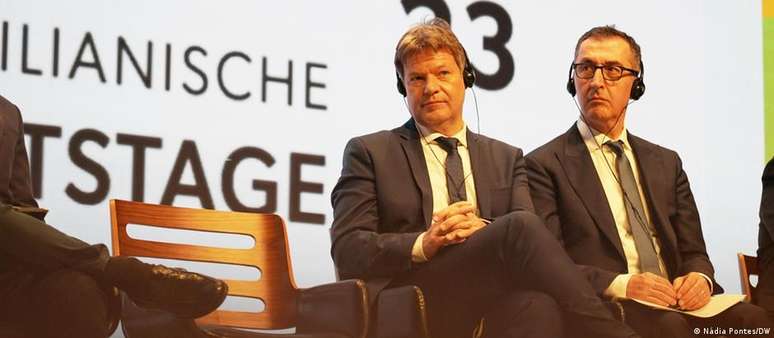During their trip to Brazil, German ministers Habeck and Özdemir highlighted the commonalities between Germany and Brazil and ignored questionable decisions by the Lula government, notes journalist Alexander Busch.-Germany was detained in person, this time in Belo Horizonte.
The event was dominated by German ministers Robert Habeck, of Economy and also Federal Vice Chancellor, and Cem Özdemir, of Agriculture and Food, who arrived in the capital of Minas Gerais early Sunday morning (03/12), with a delegation of 70 people, and they had a busy schedule almost until they left for Brasilia on Monday morning.
Both have repeated, at every opportunity, that, with the beginning of the government of President Luiz Inácio Lula da Silva, Berlin and Brasilia want to pick up the pace.
This is new: since 2015 only one German minister had been in Brasilia – Heiko Maas, then foreign minister, was in the Brazilian capital in 2019. The politically questionable impeachment of President Dilma Rousseff in 2016, the election of the right-wing populist Jair Bolsonaro in 2018 and his catastrophic environmental policy turned Brazil into an undesirable destination. No Western head of government wanted to be seen in Brasilia or received by Bolsonaro.
Now everything has changed: Lula wants to rebuild everything that his populist predecessor destroyed in terms of human rights, the fight against poverty and, above all, environmental protection.
Like a mantra, the two ministers explained that they see Brazil as an ideal partner. They did so at the meeting with the representatives of German companies, at the opening of the economic meeting, at the signing of the memorandums of intent to expand cooperation. At all times, both praised host Brazil.
Habeck was keen to show his euphoria to once again have Brazil on the side of those who want to protect the world’s environment and climate. “We must be grateful that we have a government that wants to protect the rainforest again,” he said, adding, already emotionally, “Tears come to my eyes when I see how this government is making a 180-degree turn” in environmental protection. .
This is why Habeck and Özdemir insisted on the agreement between the European Union and Mercosur, which has already been negotiated, but ended up being shelved in 2019 due to the Bolsonaro government’s environmental policy.
Both consider the agreement necessary to deal with China’s advance in South America, as this effectively undermines the protection of the Amazon and the environment in South America. Even the German farmer can have no interest in a world of increasingly authoritarian regimes.
What both German ministers ignored is that, just two and a half months after the new government took office, some of the new government’s decisions are proving not so tenable. It’s about corruption, cronyism, investments in oil exploration.
All of this leaves doubts as to whether the Lula government will adhere to ESG criteria, which stands for environment (environment), social and governance.
For example: Lula has changed nothing in his 37 ministries, despite widespread suspicions of corruption and press reports about it. Lula hopes, after all, to count on the votes in Congress.
The commands of state companies will have to be occupied again by politicians and not by specialists of proven ability.
Lula strongly attacked the independence of the central bank. He has appointed PT-linked trade unionists to pension funds with huge investment resources.
These are just a few examples of decisions that question the G of ESG criteria, which is whether the government will distinguish between self-interest and public interest.
None of this is a good sign, as PT governments have been marred by major corruption scandals.
And the new government has also made questionable decisions on climate protection. Petrobras, for example, will once again invest heavily in oil production and refineries and only then will emissions reductions be considered. No one knows how this will help Brazil meet its emissions targets.
From a strategic point of view, it is understandable that Berlin highlights the commonalities with Brasilia, for example to strengthen cooperation in the agreement with Mercosur. But it is naive to think that, as if by magic, everything changed for the better in Brazil on January 1st.
—
Text reflects the author’s opinion, not necessarily DW’s.
Source: Terra
Rose James is a Gossipify movie and series reviewer known for her in-depth analysis and unique perspective on the latest releases. With a background in film studies, she provides engaging and informative reviews, and keeps readers up to date with industry trends and emerging talents.






